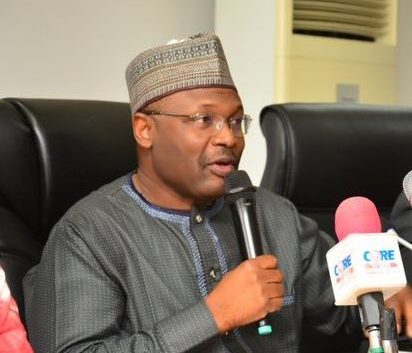- Governor Sanwo-Olu flags off Ojota-Opebi Link Bridge, to be completed in 20 months
- Allow Nigeria go to 2022 World Cup, don’t play qualifiers – Ghana Parliament member tells Black Stars
- There was no second sex tape, Kim Kardashian refutes Kanye West’s claims
- Jaruma Remanded In Prison Over Post On Regina Daniels And Ned Nwoko
- Lanre Gentry confirms paternity of last son with Mercy Aigbe, says ‘He’s my son’ (Photo)
Over 84 million Nigerians are registered to vote In 2019 – INEC

The Independent National Electoral Commission (INEC) says it has captured 14,551,482 new voters in the Continuous Voter Registration (CVR) exercise, which began on 27th April 2017 and was suspended on 31st August.
Chairman of the Commission, Prof. Mahmood Yakubu made the disclosure on 6th September during the Commission’s third quarterly consultative meeting with Resident Electoral Commissioners (RECs), held at INEC’s Headquarters, Abuja.
Addressing the RECs, Prof. Yakubu said: “As you are aware, the Commission concluded the current phase of the nationwide CVR exercise last week. For a period of 16 months, from 27th April 2017 to 31st August 2018, the exercise was conducted continuously in all the states of the federation and the Federal Capital Territory (FCT) as envisaged by the Electoral Act.
“At the end of the exercise, a total of 14,551,482 new voters were registered. If this figure is added to the existing register of 69,720,350 voters, it means that the nation now has a voter population of 84,271,832”.
He however hinted that the figure may reduce after the Commission carries out a cleanup of the register to rid it of multiple registrations saying “the figure may drop slightly after we run the Automatic Fingerprint Identification System (AFIS). The current figure represents about 21 percent increase on the existing register”.
He continued: “the Commission is also processing 769,917 requests for intra and inter-State transfers as well as 1,178,793 requests for replacement of lost, damaged or cards with misspelt names or incorrect personal details of voters as required by law. This means that the Commission has to print a total of 16,500,192 Permanent Voters’ Cards (PVCs) and make them available for collection by citizens ahead of the 2019 general elections.
“Already, the Commission has printed the PVCs for those registered in 2017 and delivered them to States for collection. I can also confirm that the PVCs for 2.7 million voters registered in the first quarter of 2018 have been printed and will be delivered to the States next week”.
The INEC Chairman added that as part of its efforts aimed at ensuring that citizens got their PVCs with minimum inconveniences, the Commission entered a partnership agreement with the Nigerian Telecommunications Commission (NCC) to send bulk SMS to citizens for the collection of their PVCs. He said: “We shall ensure that the process of collection is simplified with minimum inconvenience to citizens. We will also ensure that information about the collection of PVCs is widely disseminated. Already, we are partnering with telecommunication companies to send bulk text (sms) messages to citizens for the collection of their PVCs.
“Today’s meeting will also consider other options, including the devolution of collection to Ward level. We however wish to restate the Commission’s policy that no PVCs will be collected by proxy. Registered voters must endeavour to collect their cards personally. We are working hard to ensure that no PVC goes into the wrong hands”.
Commenting on preparations for the forthcoming Osun state governorship election scheduled for Saturday, 22nd September 2018, Prof. Yakubu said: “All processes and activities are going according to our timetable and schedule of activities released almost a year ago. The last major activity was the presentation of the Voters’ Register to each of the 48 political parties fielding candidates in the election, giving detailed information of the distribution of the 1.6 million registered voters by Local Government Areas, Wards and Polling Units.
“We are working on a multi-faceted approach to the menace of vote-buying and other sundry electoral malpractices. We will introduce changes to the election-day administration of our polling units, in addition to the electronic tracking of our sensitive materials. We are discussing with the security agencies on a more vigorous enforcement of the law against voter-inducement. Furthermore, we are working with the Inter-Party Advisory Council (IPAC) and other stakeholders on voter education and sensitization”.